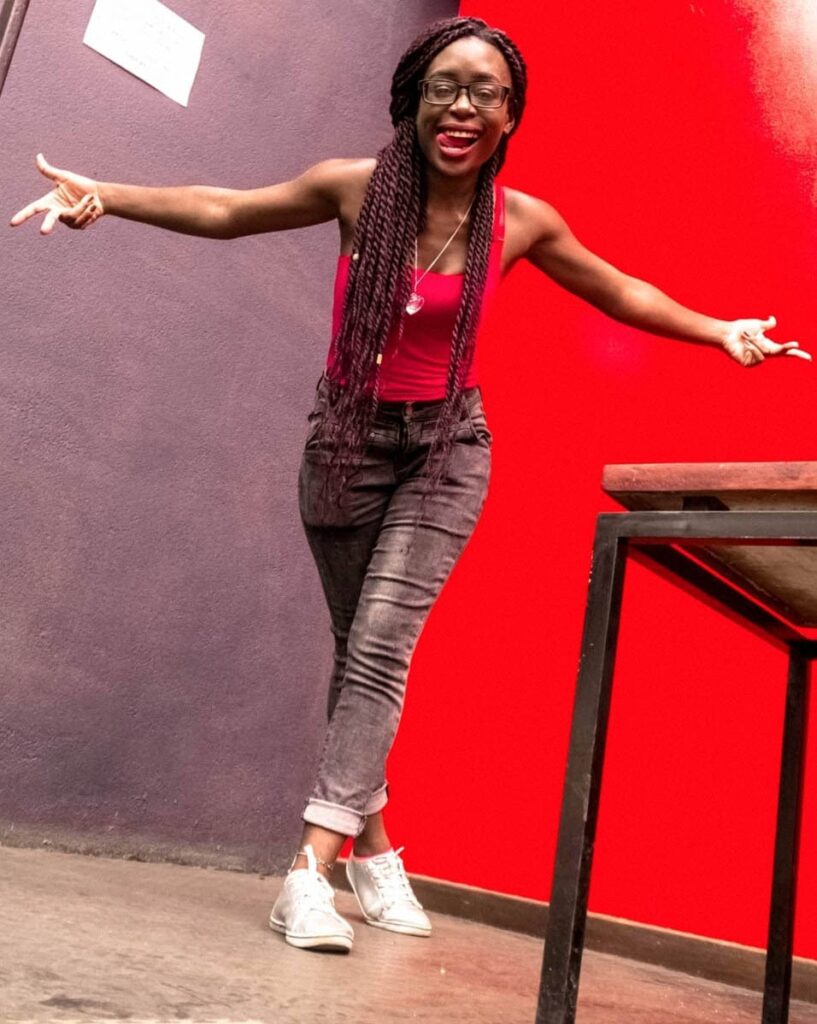Dead funny: Sharon Chideu and Samantha Kureya, who endured retaliatory violence, are two Zimbabwean women comedians speaking truth to power. Photo: Instagram
In 2019, Zimbabwean comedy made international news when comedian Samantha Kureya, known on stage as Gonyeti, was abducted and tortured by masked gunmen.
She is one of many comedians in Zimbabwe who have faced violent repercussions for their comedy. Interviewing 23 stand-up comedians in Zimbabwe in 2018 and 2019, I discovered that several comedians had been intimidated, harassed or arrested because they joked about the “wrong” political party, policy or decision.
Samm Farai Monro, aka Comrade Fatso, points out how artists in the nation joke: “You have freedom of expression but not freedom after expression.” This highlights the potency of Zimbabwean comedy. After all, as I argued recently, stand-up comedy has become one of the few spaces in the repressive Zimbabwean environment where people speak out in front of a crowd. The possibilities that emerge from this are evident when female comedians resist patriarchal power relations through stand-up.
Being a female stand-up in Zimbabwe
In Zimbabwe the public sphere is regulated through gender norms that tend to delegitimise female actors when they try to make a claim at political power.
Academic Gibson Ncube highlights this in a paper that points out that female politicians have often been described either negatively as “whores” or “witches” when attempting to claim power, or positively as “mothers” when taking a more submissive role.
During my research, I identified only six active female stand-ups in Zimbabwe.
One female comedian explained that audiences will not become as attached to women stand-ups because they expect them to eventually settle down, get married, have children and stop performing. Another Zimbabwean stand-up, Munyaradzi Guramatunhu, put it eloquently in a recent interview: “I do not think that the reason we are not in the industry in great numbers is because we lack the confidence. It is because we do not get afforded the same grace to just be viewed as humans as the men are.”
This sexism also affects the choices Munya – as she is known on stage – makes about her performance before a show. Talking with me in 2018, she pointed out the added scrutiny that female stand-up comedians face, while their male counterparts can wear a suit or be casually dressed: “If you’re in heels everybody is judging how you are walking, if you are in heels and a skirt everybody is like, ‘Ohh and then we could see up her skirt, and she was dressed so appallingly.’ And then if you are dressed too casually: ‘No wonder she is a stand-up comedian, she doesn’t take herself seriously.’”
Yet my research shows that once on stage, the women who do choose to perform stand-up in Zimbabwe feel empowered to speak out in ways that can interrupt and resist sexism.
Empowered to talk about sex
Sharon Chideu, aka Magi, captures this empowerment in sex-talk. She told me how women are silenced in daily life: “Okay, traditionally, culturally … you are just there to make babies, you are just there to be a wife, and you don’t enjoy sex … And one-night stands, don’t cheat. That’s for guys.”
 Sharon Chideu unsettles attempts to suppress her agency by affording herself, in Munya Guramatunhu’s words, “the same grace to just be viewed as humans as the men are”.
Sharon Chideu unsettles attempts to suppress her agency by affording herself, in Munya Guramatunhu’s words, “the same grace to just be viewed as humans as the men are”.
Later in our interview she describes how these power relations are blurred on stage: “When you (are) talking about how (you) had sex, and you can sense the reaction, like: ‘Wow, she is talking about that?’ … ‘What!? She is going there?’ and then they laugh.”
How to disrupt the patriarchy
One of Chideu’s 2018 sets illustrates how empowered female comedians can resist patriarchal power relations. She draws on common conceptions of how women should or should not act in Zimbabwean society, neatly reframing them.
For example, Chideu jokes that her child was “ugly” at birth because it looked just like her mother-in-law, quickly adding that the child has grown to become cute. This joke plays with the idea that women should be nurturing and caring by showing, even if only for a moment, an instance where Chideu is not that.
On stage Chideu puts on display a version of her own life: she is a mother, an artist, sometimes caring, sometimes not, someone with sexual needs and desires who acts upon them because she wants to, not because she is forced to.
Emboldened, she unsettles narrative attempts to suppress her agency by affording herself, in Munya Guramatunhu’s words, “the same grace to just be viewed as humans as the men are”.
Stand-up comedy and female emancipation
Although there are still far fewer female stand-ups in the country, the field keeps on growing and female comedians keep gaining more recognition.
Indeed, Kureya – who was abducted and tortured and who has performed both skit and stand-up comedy – was the first woman to be nominated for an Outstanding Comedian award at the Zimbabwean National Arts Merit Award in 2017. She was nominated again in 2018 and followed, in 2019, by another female comedian, Chideu.
To better understand women’s emancipation in countries like Zimbabwe, it’s useful to look beyond the so-called “serious” practices of institutional politics.
This is an edited version of an article first published by The Conversation
